A federal judge ruled an abortion law signed by Vice President Mike Pence while he was governor of Indiana is unconstitutional.
The law, signed by Pence in March 2016, banned abortions sought because a fetus could potentially be diagnosed with a disability, among other provisions.
Seventh Circuit Court of Appeals Judge William J. Bauer affirmed a district court ruling striking down the law on Thursday.
"The non-discrimination provisions clearly violate well-established Supreme Court precedent holding that a woman may terminate her pregnancy prior to viability, and that the State may not prohibit a woman from exercising that right for any reason," he wrote.
Shortly after the bill was signed, Planned Parenthood of Indiana and Kentucky (PPINK), represented by the American Civil Liberties Union of Indiana, filed a complaint in the Southern District of Indiana seeking an injunction from the non-discrimination and fetal disposition provisions.
The non-discrimination provisions prohibit abortions based solely on race, sex or diagnosis or a potential diagnosis of a disability such as Down syndrome, while the disposition provision dictated how a provider must dispose of the aborted fetus.
PPINK argued that the disposition provision would render it unable to contract with third-party cremation providers and would require providers to bury, cremate or entomb the fetuses.
When U.S. District Court Judge Tanya Walton Pratt issued a preliminary injunction in June 2016, she said the law would likely be found unconstitutional and that it violated U.S. Supreme Court precedents that protect a woman's right to choose an abortion before a fetus is viable and the right to privacy in making that decision.
She issued a permanent injunction against the measure in September. Indiana Attorney General Curtis Hill appealed.
"By declaring unconstitutional a state law that would bar abortions based solely on race, sex or disability such as Down syndrome, a federal judge has cleared the path for genetic discrimination that once seemed like science fiction," Hill said in a September statement to IndyStar. "This state has a compelling interest in protecting the dignity of the unborn and in ensuring they are not selected for termination simply because they lack preferred physical characteristics."
When contacted Friday, a spokesperson for Hill's office declined to comment further.
In his Thursday opinion, Bauer wrote that the provisions represented a barrier in a woman's right to choose.
"The provisions prohibit abortions prior to viability if the abortion is sought for a particular purpose," Bauer wrote. "These provisions are far greater than a substantial obstacle; they are absolute prohibitions on abortions prior to viability which the Supreme Court has clearly held cannot be imposed by the State."
Bauer further wrote that the "binary choice" theory established by 1992's Planned Parenthood of Southeastern Pennsylvania v. Casey — in which a woman may terminate her pregnancy only if she decided she did not want a child before becoming pregnant — is contrary to the idea that a woman's right to choose is rooted in her Fourteenth Amendment right to privacy.
"It is entirely inconsistent to hold that a woman’s right of privacy to terminate a pregnancy exists if a woman decides before she becomes pregnant that she does not want to bear a child, but that the State can eliminate this privacy right if a woman later decides she wants to terminate her pregnancy for a particular purpose," he wrote. "Nothing in the Fourteenth Amendment or Supreme Court precedent allows the State to invade this privacy realm to examine the underlying basis for a woman’s decision to terminate her pregnancy prior to viability."
Jane Henegar, executive director of the ACLU of Indiana, said in a written statement that Thursday's decision "affirmed a woman's fundamental right to make her own personal medical decisions."
"This ruling is a victory for women and another repudiation of attempts by Indiana politicians to restrict — and even ban — access to abortion care," she said. "Deeply personal decisions about abortion should be made by women in consultation with their doctors — not by politicians or government bureaucrats.”



